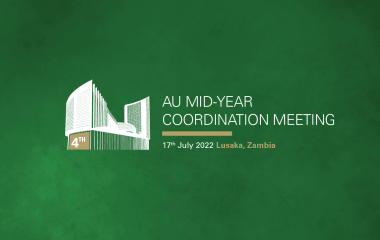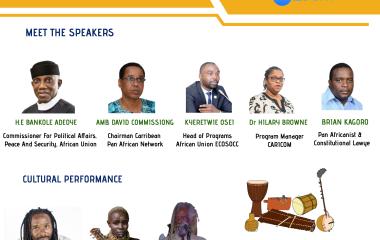Events
-
July 15, 2022Event
The Young Africans Writing Contest (YAWC) 2022 & The Policy Booklet on the 'Migration Policy Framework for Africa (MPFA)
-
September 09, 2021Event
Media Advisory
What: Award Ceremony for the Young Africans Writing Contest 2021
-
July 29, 2021Event
Media Advisory
What: Inaugural Africa-Caribbean People to People Forum.
When: July 29th, 2021 at 14:00 UTC; (16:00 CAT)
-
May 24, 2021Event
What: Launch of the Young Africans Writing Contest 2021
-
EventMarch 02, 2017 to March 04, 2017The Standing Committee of the 2nd ECOSOCC Permanent General Assembly Convene its 5th Ordinary Session, Cairo, Egypt
-
EventJanuary 18, 2017ECOSOCC Clusters Operationalization
-
EventNovember 03, 2016 to November 05, 2016Civil Society Consultation Prior to the Peace and Security Council Retreat, Livingstone, Zambia
MEDIA ADVISORY
Civil Society Consultation Prior to the Peace and Security Council Retreat, Livingstone, Zambia
-
EventAugust 30, 2016Ghana Launches National ECOSOCC Chapter
-
November 19, 2015 to November 22, 2015Event
Global African Stakeholders Diaspora Convention, Washington DC, 19- 22 November 2015
Under the auspices of the AU ECOSOCC and the support of AU CIDO Secretariat, the Global Africa Diaspora Convention will take place in Washington, DC / Baltimore, Maryland on November 19-22, 2015. The Convention will focus on the role of Africa Diaspora in Africa's development on the most vital issues of identifying and applying capacities; sensitizing the shared values of the African Union's Agenda 2063 and the unique role of AU ECOSOCC in engaging the civil society as partners in development; and improving stakeholders' understanding and cooperation on common policies that are applicable to all constituencies, including Diaspora representation at the AU ECOSOCC.
After the Global Africa Diaspora Summit in 2012 and the AU Declaration, the Global Africa Diaspora Convention provides a common forum and unprecedented opportunity for diverse constituencies, including women and youth organizations, in the Diaspora to assess common developments and highlight innovative ways to improve outcomes that rely on system building and harmonized recommendations for evidence-based policies. The expected outcomes are enumerated in the concept and content of the program.
The Global Africa Diaspora Convention will bring heightened focus on the African Union 2015 Theme: Year of Women Empowerment and Development towards Agenda 2063 with innovative programs and support for the CIDO's implementation of the Africa Diaspora Volunteer Corps and other AU Diaspora Legacy Projects. Events in the Margin will include information on opportunities in member state and Diaspora participation in the NEPAD Africa Trade Fair on Indigenous Products and Services in May 2016.
Stakeholders will participate in various Roundtable and Plenary Sessions. Representatives of organizations, policy makers, the media, representatives of Historical Black Colleges and Universities, public and private sector leaders, are expected to attend. The Presiding Officer of the AU ECOSOCC is expected to address the joint assembly of stakeholders.
For further details, please visit www.globalafricadiaspora.org; Evelyn Joe at 1-240-706- 6885, Mr. Kyeretwie Osei: Oseik@africa-union.org and Ms. Eiman Kheir: KheirE@africa-union.org.
-
EventOctober 21, 2015Communiqué of the Constitutive Meeting of the Core Group for the Operationalization of the ECOSOCC Political
Communiqué of the Constitutive Meeting of the Core Group for the Operationalization of the ECOSOCC Political
Affairs Cluster, 11-12 October 2015, Nairobi, KenyaThe first phase of the operationalization of the Sectoral Cluster Committees of the Economic, Social and Cultural Council of the African Union (ECOSOCC) began with the conclusion of the Constitutive Meeting of the Core Group for the Operationalization of the ECOSOCC Political Affairs Cluster in Nairobi, Kenya from 11-12 October 2015.
The session which was chaired by Mr. Omar Faruk Osman, the Chairperson of the Cluster commenced with addresses by the Cluster Committee Chairperson, the ECOSOCC Presiding Officer, Mr. Joseph Chilengi and the Director of CIDO and Head of the ECOSOCC Secretariat, Dr. Jinmi Adisa.
In his welcome address, the Chairperson of the Sectoral Cluster Committee observed that Article 11 of the ECOSOCC Statutes placed premium on the operationalization of Sectoral Cluster Committees as the key operational mechanisms of ECOSOCC to formulate and offer advisory opinions. Thus it was a singular honor for him and his Committee to kick-off the process. He observed that he was convening the core component of the Cluster Committee to deliberate on its mission, purpose, activities, work plan, financing and strategic partnerships. The Political Affairs Cluster offered an appropriate model in this context.
In turn, the Presiding Officer, Mr. Joseph Chilengi, commended the Cluster Chairperson, Mr. Osman and his core membership for leading the way in this regard. He observed that since its inception, the 2nd Permanent General Assembly has prioritized the operationalization of Clusters. His acceptance speech on election as Presiding Officer on 22 December 2014 highlighted this issue which also commanded attention of the 1st Ordinary Session of the 2nd Permanent General Assembly in Cairo from 27 February to 1st March 2015 and the subsequent Ordinary and Extra-Ordinary Sessions of the Standing Committee as the executive organ of ECOSOCC respectively. The focus on operationalization of Clusters is running concurrently with processes for establishing National ECOSOCC Chapters. These processes demonstrate the commitment of the 2nd General Assembly to fully and effectively perform its functions efficiently as required by the Constitutive Act of the Union. He thanked the Members of the General Assembly and the Standing Committee for their steadfastness, devotion and collegial spirit as a hallmark of the new ECOSOCC Assembly. Finally, he thanked the Secretariat in CIDO under the leadership of the Director, Dr. Jinmi Adisa for the vigour, drive and competence it has shown in its singular drive to make ECOSOCC successful.
The Director of CIDO and Head of ECOSOCC Secretariat underlined the uniqueness of this experience. He noted that while the Sectoral Clusters were recognized in the ECOSOCC Statutes as the key operational mechanisms of ECOSOCC it was not established by the Interim or 1st Permanent General Assembly. The decision to do so by the 2nd Permanent General Assembly is thus historic and provides concrete evidence of its business approach combined with its goals oriented and policy responsibility focus.
The opening session was followed by six working sessions over a two day period. Subsequently, the Cluster meeting was concluded on 12 October 2015 with the following conclusions and recommendations:
I. On the Mandate of the Political Affairs Cluster
a) The Committee recognized that its mandate of operation was derived from the ECOSOCC Statutes and specifically Article 11 section (b). Article 11 provided the legal framework for the establishment of ten (10) Sectoral Cluster Committees as key operational mechanisms of ECOSOCC to formulate opinions and provide inputs into the policies and programmes of the African Union. Article 11(b) then spells out the core areas of the mandate of the Political Affairs Cluster as including Human Rights, Rule of Law, Democratic and Constitutional Rule, Good Governance, Power Sharing, Electoral Institutions, Humanitarian Affairs and Assistance, etc.
b) Concurrently, the Committee decided that the scope for its implementation of this mandate will be conceived in a dynamic rather than static context. It will cover matters arising subsequently and others related and required for the successful implementation in this regard. Article 11 (b) takes due note of this in its provisions, etc that does not forgo considerations arising from emerging needs.
c) The Committee also recognized the need for its programmes and workplan to give priority to programs on the politics of Development with special emphasis on Post 2015 Development Agenda, Sustainable Development Goals and the implementation of Africa’s Strategic vision and on Agenda 2063.
d) The dynamic interpretation of the mandate of the Political Affairs Cluster would imply that coordinated agenda of other line responsibilities such as Migration in Social Affairs Cluster or Agenda 2063 in Cross-cutting Cluster, etc are key components of the work programme.
e) The efforts of the Political Affairs Cluster would place emphasis on the civil society niche of the various political programmes of the AU so that it can add value inherently. This orientation will place emphasis on dissemination of information, advocacy and mobilization of mass citizenry, monitoring and evaluation of compliance across Member States and institutions, program and audit for performance efficiency, etc.
II. On Structure and Category of Membership
a) The Committee decided that the core group of ECOSOCC cannot by itself implement the mandate of the Political Affairs Cluster. More so, as its legitimacy would emphasize the need for interconnectivity with the wider African civil society community that it represents in the African Union.
b) The core component will be expanded to fulfill the wider functions of the Cluster.
c) Accordingly, there will be two main categories of membership. The core membership will be composed of members of the 2nd Permanent General Assembly and a selected but small group of field experts as invited members with specific skills in the area. The second category will be associate members embracing all NGOs of various types working seriously in areas pertaining to the mandate of Clusters.
d) The core group will be responsible for driving the policy agenda and making representations to the ECOSOCC and AU policy organs while both the core group and associate group members together will coordinate the implementation of programs. The associate category can also make policy recommendations for consideration of ECOSOCC Policy organs.
e) Cluster work plan for program implementation must conform to the requirements of ECOSOCC Statutes and the Decisions of the AU Executive organs.
f) The implementation of Cluster programs should also be decentralized in regions and Member States in coordination with national ECOSOCC Chapters.
III. On Rules of Procedure of the Political Affairs Cluster
a) The Cluster set up a small Committee of its core group to work with the CIDO Secretariat, Bureau of ECOSOCC and the Office of the Legal Counsel of the AU Commission to draw up the Rules of Procedure for the Political Affairs Cluster.
b) The Cluster also decided that until the Rules are developed, it will apply the Rules of Procedure of the General Assembly or the Standing Committee as deemed suitable.
IV. On Cluster Work Plan
a) The Committee developed, discussed and adopted its Cluster Work Plan (enclosed)
b) Appreciated the need to liaise with and engage the wider civil society community, partners and the appropriate organs of the AU to support the implementation matrix. As a first step, support is being mobilized for a civil society conference to audit the progress made in the implementation of the African Governance Architecture (AGA).
V. On Partnership
a) The Committee recognized the need of establishing a framework of strategic partnerships to support the implementation of its policy and program plans.
b) Such partnerships will have five (5) major dimensions:
(i) A set of relationships with coordinate AU organs and agencies whose cooperation are required. These will include primarily, the Citizens and Diaspora Directorate of the AU (CIDO), the Political Affairs Department, AUC, the Pan-African Parliament, the African Commission on Human and People’s Rights, the African International Law Commission (AUCIL), the Advisory Board on Anti-Corruption, the African Committee of Experts on the Rights and Welfare of the Child (ACERWC), the African Court on Human and Peace Rights, Regional Economic Communities (RECs), Regional Economic Mechanisms (REMs) and others.
(ii) A set of partnerships with the broader African civil society community dealing with the range of issues covered by the mandate of the Cluster or those related with or having implications of that mandate.
(iii) Cooperating partners, foundations and financial institutions or private sector wishing to support Cluster activities in accordance with the rules and regulations of the African Union.
(iv) Territorial relationship with the other organs of ECOSOCC particularly the Standing Committee, the Bureau, the General Assembly and through them, the Executive Organs of the Union, the Executive Council and Assembly of Heads of State and the Government.
(v) To stimulate active linkages with civil society organizations and networks across Member States, regions and the continent at large.
VI. On Financing
a) Recognizes the need to seek wider financial support within the framework of AU Rules and Regulations as the current level of support cannot even be minimally sufficient for implementation of Cluster programs and activities.
b) Encourages Cluster to seek strategic partnerships across the board to sustain financing requirements.
c) Specifically requests the Standing Committee, Bureau and Presiding Officer in liaison with the Secretariat of ECOSOCC to urgently employ a consultant before the end of the 1st Quarter of 2016 to produce a framework document to be considered, consolidated and approved to implement the provisions of Article 13(2) of the ECOSOCC Statutes that “ECOSOCC may however mobilize resources from extra-budgetary sources in accordance with guidelines laid down by the Executive Council”.
d) Requests the Presiding Officer and the Standing Committee to make all efforts to ensure the submission to and approval of this framework of support at the Ordinary Session of the Executive Council in June/July 2016. It should also be part of the progress report of ECOSOCC to Council in January and June/July 2016 Ordinary sessions.
VII. Annual African Civil Society Convention on Democracy, Good Governance and the Rule of Law
Announces the decision to host and organize an annual African Civil Society Convention on Democracy, Good Governance and Rule of Law involving all civil society organizations across the five regions of the African continent. The Convention will focus on a burning theme in the area of this mandate in consultation with the large African civil society community.
-
EventOctober 08, 2015Milestone: ECOSOCC begins operationalisation of Sectoral Cluster Committees, Nairobi, Kenya, 11-18 October 2015
MILESTONE: ECOSOCC BEGINS OPERATIONALISATION OF SECTORAL CLUSTER COMMITTEES, NAIROBI, KENYA, 11-18 OCTOBER 2015
The Economic, Social and Cultural Council of the African Union (ECOSOCC) will attain another milestone early next week when it begins the process of operationalization of its Sectoral Cluster Committees in Kenya, Nairobi from 11-18 October 2015.
Article II of the ECOSOCC Statutes qualifies the “Sectoral Cluster Committees” as the “key operationalization mechanisms of ECOSOCC to formulate opinions and provide inputs into the policies and programs of the African Union.” The Sectoral Cluster Committees “shall also prepare and submit advisory opinions and reports of ECOSOCC.”
The Sectoar Cluster Committees were neither formed in the life of the Interim General Assembly of ECOSOCC (2005-2008) or the 1st Permanent General Assembly (2008-2012). The issue has been prioritized by the 2nd Permanent General Assembly since its inception on 22 December 2014. In his acceptance speech at the inauguration of the 2nd Assembly the Presiding Officer, Mr. Joseph Chilengi, underlined this task as pivotal. Subsequently, the 1st Ordinary Session of the 2nd Permanent ECOSOCC Assembly that met in Cairo from 26 February to 1st March 2015 reconfirmed it in its Decisions. The Standing Committee as the Executive Organ of ECOSOCC at its 1st and 2nd Ordinary Sessions held in May and August 2015 respectively set the guidelines and modalities for the setting up of Sectoral Cluster Committees.The operationalization of Sectoral Cluster Communities establishes the main pillar for the actualization of ECOSOCC mandate and facilitates ECOSOCC interactions with cognate line departments of the AU Commission and interconnectivity with the wider African civil society community.
The operationalization process would be in two phases. Four of five clusters including Political, Peace and Security, Gender and Women Development, amongst others, would be operationalized in October 2015 while a second set of Clusters will be operationalized in November 2015. The formation of these Clusters is a milestone that will make ECOSOCC fully operational and serve to formalize its framework for advisory opinions.
-
EventSeptember 25, 2015MILESTONE: ECOSOCC BEGINS WORK ON THE BUILDING OF ECOSOCC NATIONAL CHAPTERS
- Page 1
- ››
















